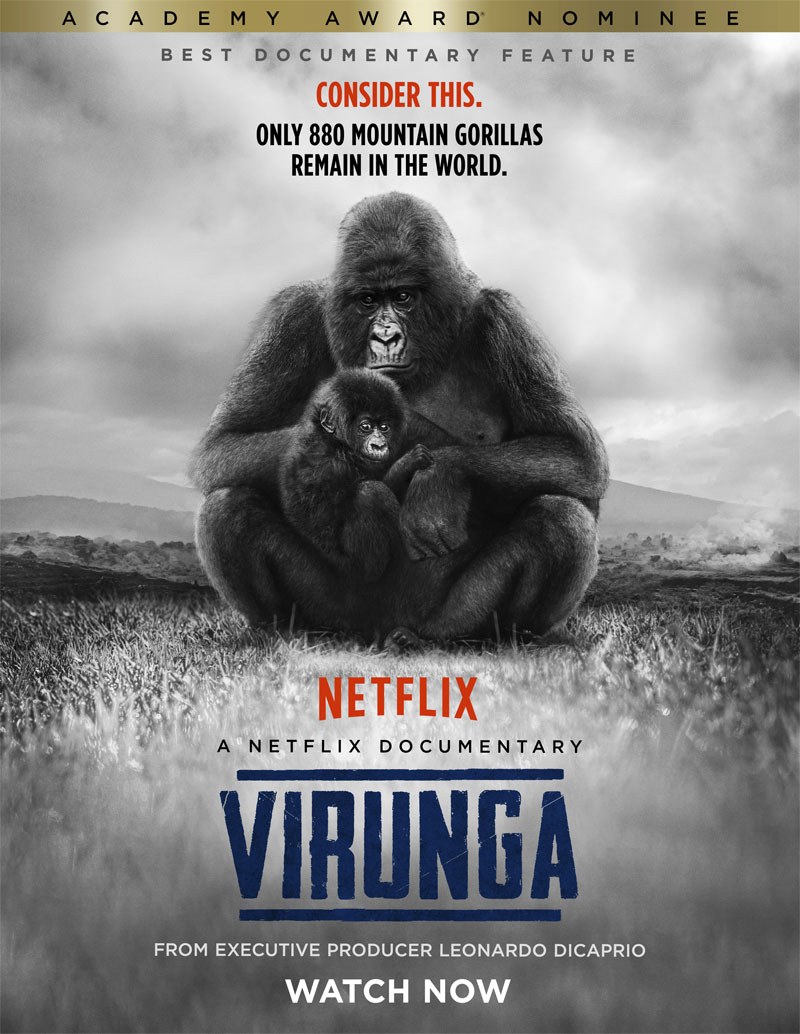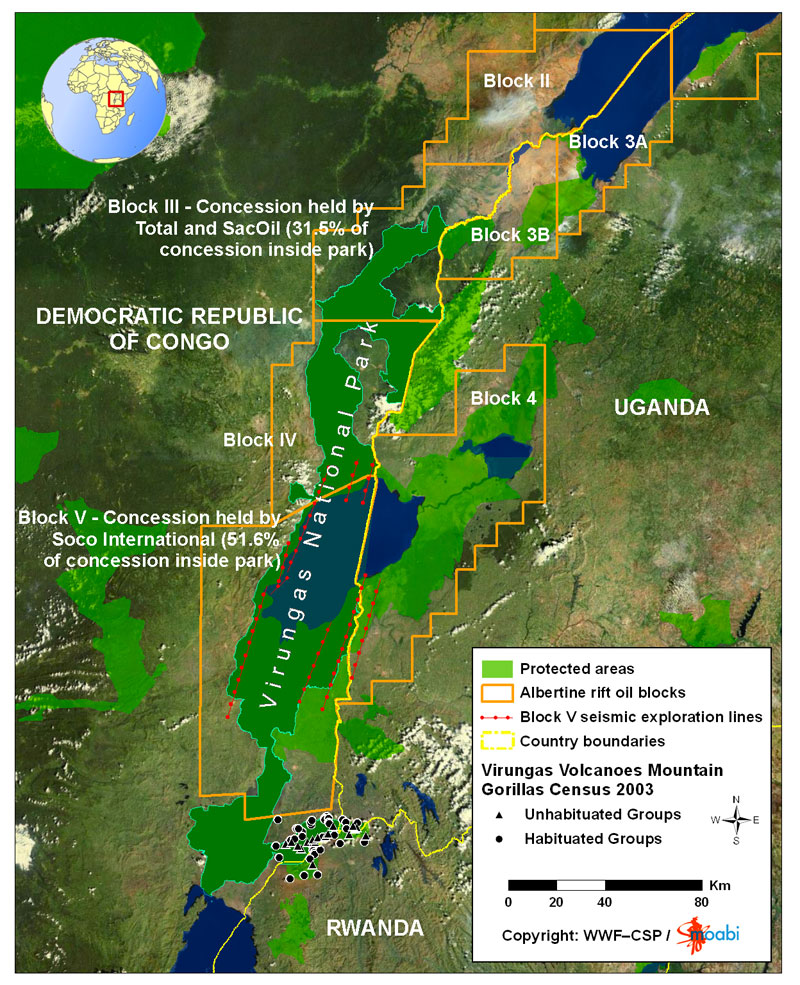Consider this. Only 880 mountain gorillas remain in the world
Guest blog by Ben Westwood
The Virunga National Park was established in 1925 as Africa’s first national park and has been a UNESCO-designated World Heritage Site since 1979. Known for its exceptional (bio)diversity, containing more bird, mammal and reptile species than any other protected area on the African continent, it is also home to one of the last populations of the Mountain Gorilla (made famous in neighbouring Rwanda by the work of Sir David Attenborough & the 1988 film starring Sigourney Weaver ‘Gorillas in the Mist’).
The trials of protecting the park & its wildlife have been enormous over the years. There has always been the threat of poaching for both the animals & also for the trees (burnt for the charcoal trade) but in the last 30 years The Democratic Republic of Congo (DRC) has also suffered major political instability with rebel groups, armed militias & refugee crises (from the Rwandan Genocide) which have all also created a lot of damage in the park.
Throughout this turbulent time the parks rangers have been the front line in protecting the park & their dedication is inspiring. 140 rangers have lost their lives since 1996.
In response to the ranger’s efforts though, the Mountain Gorilla (extremely rare and listed as one of the most critically endangered species) population has increased in number.
Since 2008 Belgian national, Emmanuel de Merode has been Director of the park.
His approach to saving the park has been to negotiate with all groups, including rebel leaders, Virunga’s neutral status.
Under his leadership initiatives have been started that ‘bring greater stability to the region. In 2013 he assisted in the launching of the Virunga Alliance [5] in an effort to drive the post-war economy of eastern Congo as an instrument for peace-building in the region. The initiative is based on 127 local institutions from the private sector, civil society and government agencies committing to the sustainable development of the parks resources, through tourism, rural electrification, sustainable fisheries and agriculture. A major program is now underway that aims to generate 80 to 100,000 employments in the post-war communities living around the national park, providing young Congolese men and women viable alternatives to engaging in conflict related activities’.
Now a new development threatens the park.
London-listed company Soco International, one of the UK’s 200 biggest companies received a Presidential decree from the Democratic Republic of Congo (DRC) IN 2010 to explore for hydrocarbons in an area called Block V which currently encompasses an area of the Virunga National Park.
Of course drilling for oil & the infrastructure needed to achieve this is not at all compatible with Virunga’s status as a national park & would be illegal under its UNESCO status, not to mention the damage to the environment which it would cause.
‘Soco International‘s own environmental impact assessment reports admit that oil exploration is likely to cause pollution, irreparably damage habitats and bring poaching to the park’.
(& for the umpteenth time it must be said again that in order for the world to meet its IPCC target of reducing carbon emissions to prevent catastrophic climate change, 80% of the KNOWN world’s oil reserves must already stay in the ground).
Notwithstanding this Soco has pushed ahead with its plans & as of July 2014 it had completed its seismic survey in the park.
Soco’s involvement in the area has been very murky. The NGO, Global Witness (an organisation which investigates the role of natural resources in funding corruption & conflict around the world) has been reviewing material gathered as part of an undercover investigation by UK film-makers, some of which has been used in the new documentary ‘Virunga’ , released in April 2014.

‘This material includes video footage of a Soco ally trying to bribe a senior park ranger to spy on the head of Virunga, local Soco agents handing out envelopes of cash to villagers to hold a demonstration (in favour of drilling), & a top Congolese parks official telling rangers that they’ will be paid money, money, money’ if they collaborate with the company.
Activists & park rangers in Nyakakoma (a small fishing village where Soco is based) have been arrested, & sometimes beaten or stabbed, by soldiers & intelligence agents after criticising or obstructing Soco’s operations (the usual).
Also raised by the undercover investigation are allegations that money has been paid to local rebel groups who have terrorised civilians & engaged in elephant poaching & illegal charcoal trading within the park, & also allegations of bribery involving an influential MP (now a government minister) in the region’.
Also the Director of the park, Emmanuel de Merode has survived a possible assassination attempt when his car was sprayed by bullets by unknown gunmen co-incidentally just after he had handed in a report on Soco’s activities to the public prosecutor in Goma. He suffered bullets in the chest, legs & stomach.
Pulling out of the park after their survey Soco has said that it would not ‘undertake or commission any exploratory or other drilling within Virunga National Park unless UNESCO & the DRC government agree that such activities are not incompatible with its World Heritage status’, an ambiguous position leaving the door open to the park being fully or partly declassified for oil.
Then ‘On March 13, 2015, the BBC reported that the Democratic Republic of Congo says it wants to redraw the boundaries of Virunga National Park to allow for oil exploration’. http://m.bbc.co.uk/news/world-africa-31876577 .
Now you may think that the issue of whether to drill or not is up to the DRC which it is. A quote from the Congolese government gives their position very succinctly: “You, Europeans, you have eaten all your animals,” Joseph Pili Pili, a senior official from the Congolese Ministry of Hydrocarbons, told the BBC, “and now you ask us to turn our backs on money the country desperately needs, the people desperately need, to protect animals?” . Oil revenues can bring in much needed infrastructure funding for underfunded countries such as the DRC (Ecuador faced the same issue), however this behaviour in a National Park reminds me of the behaviour of the Europeans to the indigenous Native Americans when they took over America. Reservation areas were proposed & imposed for the natives which were assured to them to be legally permanent. That is, until a resource of value was found on the territory whereupon the legal situation was rewritten to suit the developers.
The Native Americans were moved on & on, from reservation to reservation until in the present day they are based in the inhospitable desert (unfortunately for them again, this is where Uranium has been found & so their lands are threatened again).
What use are these natural resources if in the course of their appropriation & extraction all morals, decency & trust are broken, & the world we live in is polluted & poisoned?
In reality if these places are to be saved then it is the responsibility of the whole world & especially us in the first (richer) world to help countries like DRC & Ecuador to save their ecosystems. We will need to pay for this (Bollocks to Austerity measures).
As my mother says ‘You get out what you put in’. If we want the world to be a decent place we will have to take action here.




No comments yet